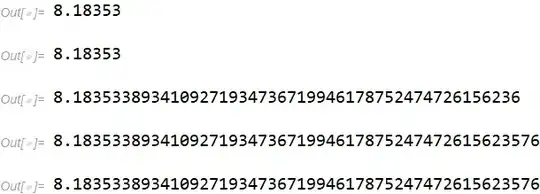Let $ x \ge b \ge 0$ and let $\mu_0 \le 1/2$. Then let $j \in {\mathbb R}$. Consider the following integral:
\begin{equation} {\mathcal J}^{(x,b,\mu_0)}_j := \frac{2^{\frac{j}{2}-1}}{\sqrt{\pi}} \cdot \int\limits_0^\infty t^{-\frac{j}{2}-1} \cdot e^{- \frac{\left( \log[\frac{b}{x}] - (\mu_0-\frac{1}{2}) t\right)^2}{2 t}} \cdot H_{j+1} \left[ \frac{\log[\frac{x}{b}]}{\sqrt{2 t} } \right] dt \tag{1} \end{equation} where $H_n[x]$ are Hermite polynomials.
By doing numerical experiments we have found that:
\begin{equation} {\mathcal J}^{(x,b,\mu_0)}_j = \left(1 - 2 \mu_0\right)^j \tag{2} \end{equation}
In[3369]:= LL = {}; M = 2;
Do[
{x, b} = RandomReal[{0, M}, 2, WorkingPrecision -> 50];
If[b > x, tmp = x; x = b; b = tmp;];
mu0 = RandomReal[{-M, 1/2}, WorkingPrecision -> 50];
j = RandomReal[{-M, M}, WorkingPrecision -> 50];
ll = {1/Sqrt[Pi] NIntegrate[
2^(j/2 - 1) (t)^(-j/2 - 1)
Exp[-((Log[b/x] - (mu0 - 1/2) t)^2/( 2 t))] HermiteH[j + 1,
Log[x/b]/(Sqrt[2] t^(1/2))], {t, 0, Infinity},
WorkingPrecision -> 20], (1 - 2 mu0)^j};
LL = Join[LL, {ll}];
, {which, 1, 100}];
Mean[Abs[#[[1]]/#[[2]] - 1] & /@ LL]
Out[3371]= 2.425121*10^-13
Being intrigued by the simplicity of this result we tried to prove it.
Below, we prove it for $ j \in {\mathbb Z}$ and $j \ge -1$. Here we go:
\begin{eqnarray} &&{\mathcal J}^{(x,b,\mu_0)}_j = \\ && \frac{1}{\sqrt{\pi}} \exp \left[ (-\frac{1}{2} + \mu_0) \log[\frac{b}{x}]\right] \cdot \sum\limits_{m_2=0}^{\lfloor \frac{j+1}{2} \rfloor} \frac{(-1)^{-m_2} (j+1)! 2^{j-m_2-\frac{1}{2}} }{m_2! \left(j-2 m_2+1\right)!} [\log \left(\frac{x}{b}\right)]^{j-2 m_2+1} % \int\limits_0^\infty t^{-j+m_2-\frac{3}{2}}e^{-\frac{\log ^2\left(\frac{b}{x}\right)}{2 t}-\frac{1}{8} \left(1-2 \mu _0\right){}^2 t} dt = \\ && \frac{1}{\sqrt{\pi}} \exp \left[ (-\frac{1}{2} + \mu_0) \log[\frac{b}{x}]\right] \cdot \sum\limits_{m_2=0}^{\lfloor \frac{j+1}{2} \rfloor} \frac{(-1)^{-m_2} (j+1)! }{m_2! \left(j-2 m_2+1\right)!} % \left(\frac{\log ^{\frac{1}{2}-m_2}\left(\frac{x}{b}\right)}{(1-2 \mu _0)^{j-m_2+\frac{1}{2}}}\right) K_{-j+m_2-\frac{1}{2}}\left(\log \left(\frac{x}{b}\right) \left(\frac{1}{2}-\mu _0\right)\right) = \\ && \left( 1 - 2 \mu_0\right)^j \cdot \left[ % 1_{j=-1} + 1_{j \ge 0} \sum\limits_{L=0}^j \left( \log[\frac{x}{b}] (1-2 \mu_0)\right)^{-L} \cdot \underbrace{ \frac{(j+1)!}{(-L+j)!} \cdot \sum\limits_{m_2=0}^{\lfloor \frac{j+1}{2} \rfloor \wedge L} \frac{(-1)^{-m_2} \left(j+L-2 m_2\right)!}{m_2! \left(j-2 m_2+1\right)! \left(L-m_2\right)!} }_{\delta_{L,0}} % \right] = \\ && \left( 1 - 2 \mu_0\right)^j \end{eqnarray} In the second line we used Rodrigues' formula and expanded the Hermite polynomials and we swapped the integration with the sum over the terms. In the third line we used (Gradshteyn & Ryzhik 3.471.9) at $\alpha = 1/2 \log[b/x]^2$, $\beta = 1/8 (1-2 \mu_0)^2$ and $\nu = -1/2-j+m_2$. In the forth line we used this result for the modified Bessel functions of a half-integer argument.
(*Check normalization. (*j\[GreaterEqual]-1;*)*)
{x, b} = RandomReal[{0, 2}, 2, WorkingPrecision -> 50]; If[b > x,
tmp = x; x = b; b = tmp;];
mu0 = RandomReal[{-2, 0}, WorkingPrecision -> 50];
n = RandomInteger[{1, 10}]; th = 9/10;
j = RandomInteger[{-1, n}];(*j\[GreaterEqual]-1;*)
1/Sqrt[Pi] NIntegrate[
2^(j/2 - 1) (t)^(-j/2 - 1)
Exp[-((Log[b/x] - (mu0 - 1/2) t)^2/( 2 t))] HermiteH[j + 1,
Log[x/b]/(Sqrt[2] t^(1/2))], {t, 0, Infinity}]
1/Sqrt[Pi] Exp[+(-(1/2) + mu0) Log[b/
x]] Sum[(j + 1)!/((j + 1 - 2 m2)! m2!) 2^(j - 1/2 -
m2) (-1)^(-m2) ( Log[x/b])^(j + 1 - 2 m2) NIntegrate[
t^(-(3/2) - j + m2)
Exp[-(1/8) (1 - 2 mu0)^2 t - Log[b/x]^2/(2 t)], {t, 0,
Infinity}], {m2, 0, Floor[(j + 1)/2]}]
(Use https://math.stackexchange.com/questions/128687/bessel-function-
integral-and-mellin-transform?rq=1 (Gradshteyn&Ryzhik 3.471.9,) at
alpha =Log[b/x]^2/2, beta = 1/8 (1-2 mu0)^2, nu = -1/2-j+m2 )
1/Sqrt[Pi] Exp[+(-(1/2) + mu0) Log[b/
x]] Sum[(j + 1)!/((j + 1 - 2 m2)! m2!) (-1)^(-m2) (
Log[x/b])^(1 - m2 - 1/2) (1/(1 - 2 mu0))^((-1/2 - j +
m2)) BesselK[-1/2 - j + m2, Log[x/b] (1/2 - mu0)], {m2, 0,
Floor[(j + 1)/2]}]
(Use https://functions.wolfram.com/Bessel-TypeFunctions/BesselK/03/
01/02/02/0001/)
(1 - 2 mu0)^j If[j == -1, 1,
Sum[(j + 1)!/(-L +
j)! Sum[((-1)^(-m2) (+L + j - 2 m2)! )/((j + 1 -
2 m2)! m2! (L - m2)! ), {m2, 0,
Min[Floor[(j + 1)/2], L]}] (Log[x/b] (1 - 2 mu0))^(-L) , {L, 0,
j}]]
((1 - 2 mu0)^j)
Having said all this my question is how do we prove $(2)$ for other values of $j$ in particular for negative integers. Clearly Hermite polynomials are well defined for the order being a negative integer as explained here for example.
Update:
By using the same considerations as above one can show that proving the identity in question is equivalent to proving that: $\sum\limits_{n=0}^\infty \frac{(-1)^{n+1} 2^{\frac{j-n}{2}} A^{\frac{n-j}{2}} (j-n+2)_n \Gamma \left(\frac{j-n}{2}+1\right) \left(I_{\frac{1}{2} (-j-n)}(A)-I_{\frac{j+n}{2}}(A)\right)}{n!} = \exp(-A)$. Here $A \ge 0 $ and $j \in {\mathbb R}$. and $I_{\cdot}(\cdot)$ is the modified Bessel function of the first kind.
